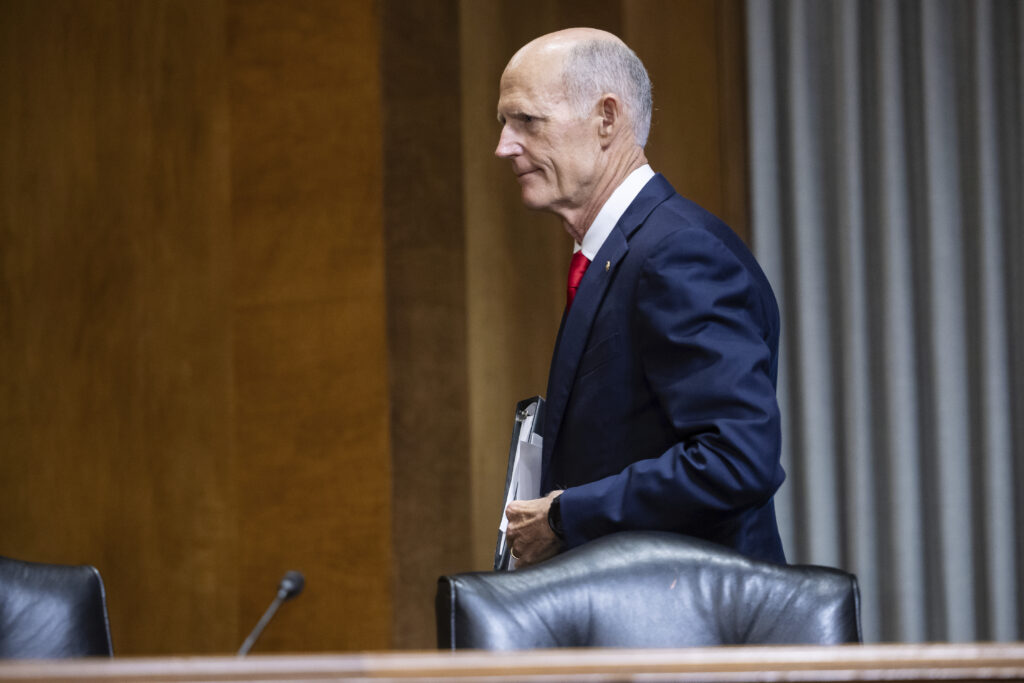Republicans might be united on the public stage as they face off with Democrats ahead of a government shutdown. But a much more divisive internal fight waits in the wings.
The year-end expiration of health insurance subsidies first created under the Affordable Care Act is already splitting the GOP, seeming to vindicate Democrats’ decision to predicate their shutdown messaging on extending the tax credits.
Republican leaders have been trying to punt the issue as they work to force Democratic senators to swallow a seven-week stopgap measure ahead of the midnight deadline, insisting they will not broach the subject while agencies are closed.
But top Democrats said they heard a different message Monday in their Oval Office meeting with President Donald Trump, leaving the sitdown convinced he’s willing to negotiate on the expiring tax credits in the weeks ahead.
That is already raising alarms among conservative Republicans, who despise the 2010 Democratic health care law known as Obamacare and who would be more than happy to see a 2021 enhancement of the premium tax credits sunset cold turkey on Dec. 31.
“The right proposal is to let them expire,” Sen. Rick Scott (R-Fla.) said Tuesday. “It’s been a complete fraud. People don’t even know they have these policies. So the right thing is to let them expire.”
Rep. Chip Roy (R-Texas), a leader of the hard-right House GOP faction, urged party leaders not to cut an “11th hour” deal on “Covid-era inflationary subsidies” in an X post Sunday.
“We’ve never voted for them. We shouldn’t now,” he said. “Do. Not. Blink.”
But Trump — who has veered the GOP away from anti-entitlement rhetoric on programs like Social Security and Medicaid — has not publicly ruled out an extension of the expanded tax credits, which benefit about 20 million Americans. Instead, in recent days, he has kept his public comments focused on purported Democratic efforts to benefit undocumented immigrants, who are already barred from receiving the subsidies.
Trump administration officials, including some involved in Monday’s White House meeting and in separate conversations with the president, confirm he is willing to talk about a possible extension with Democrats. Addressing reporters after the meeting, Vice President JD Vance said the two parties should “work on it together,” while echoing congressional Republicans in adding that talks would have to take place in the “context of an open government.”
There are self-interested reasons for Trump and Vance to want a solution: A spike in health insurance premiums for millions of Americans could be politically perilous less than a year before the midterm elections. A prominent Trump pollster, Tony Fabrizio, warned in July that allowing the subsidies to lapse “could hand the GOP majority to Democrats.”
More than a dozen moderate House Republicans want at least a one-year extension of the subsidies, while a group of GOP senators are working on a proposal that would continue them but also impose some new restrictions. Many are relieved that Trump appears to be finally entering the fray before open enrollment starts Nov. 1 and insurers start to lock in pricing for 2026.
Yet the deep internal GOP divisions have led Speaker Mike Johnson and Senate Majority Leader John Thune to privately argue, including to Trump’s team, that any talks around a possible extension will take months on Capitol Hill. In addition to major questions about the costs of an extension, a politically toxic fight over abortion coverage also threatens to bog the GOP down.
Publicly, Johnson and Thune are pushing to keep the health care discussions entirely distinct from the shutdown conversations, even as Democrats lean on the subsidies as a messaging wedge in the throes of the funding fight.
Johnson called Democrats’ ACA extension demands a “red herring” Tuesday as the shutdown drama unfolded.
“We’re happy to sit down with them and talk about the concerns they have, the issues they have with, for example, the premium tax credits,” he said. “But we can’t do that in context of a hostage situation.”
But with word of Trump’s willingness to deal now emerging, some House Republicans are broaching their own possible support for those talks — knowing that Trump will have to be intimately involved in any bipartisan deal, and give cover for its passage through the Republican-controlled Congress.
Rep. Warren Davidson (R-Ohio), a fiscal hawk who spoke out against an extension of the subsidies as recently as last week, said it’s hard to weigh in on “hypotheticals.” But he said, generally, he would trust Trump.
“I trust that if he engages that there will be something in the deal that’s worthwhile for Republicans or, you know, he wouldn’t do it,” he said.
Rep. Morgan Griffith (R-Va.), a member of the House Freedom Caucus, said he agreed with Vance that no discussions should take place amid a shutdown. But he said Trump would be wise to open up negotiations with Democrats about a phase-out of the boosted tax credits.
“I don’t want to punish the American people because their program failed,” Griffith said. “We got to come up with something different. But in the meantime, let’s figure out a glide path.”
Mia McCarthy and Jordain Carney contributed to this report.
Read the full article here
